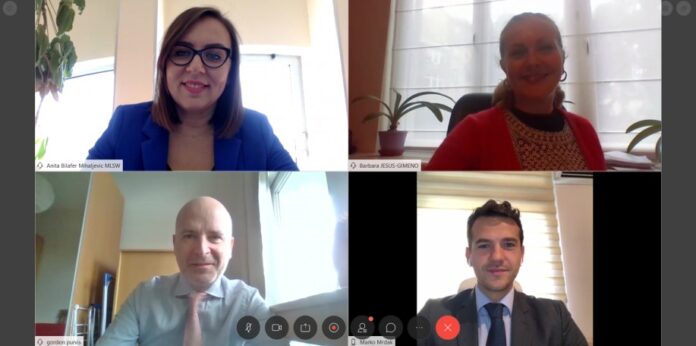Areas covered by the Subcommittee on Innovation, Human Resources, Information Society and Social Policy are of the key importance for Montenegrin citizens, therefore Montenegro will continue to strive towards the European standards in these fields.
On the 10thSubcommittee meeting on innovation, human resources, information society and social policy, which was held through an online platform, covering chapters 2 Freedom of movement for workers, 10 Information Society and Media, 19 – Social policy and Employment, 25 Science and Research and 26 Education and Culture, the representatives of the Montenegrin institutions presented key results achieved in these negotiating chapters.
The Subcommittee represents an official meeting between the EU and Montenegro, held once a year, aimed to discuss development of these areas in the framework of the Stabilization and Accession Agreement between the EU and Montenegro.
Deputy Chief Negotiator Marko Mrdak pointed out that, in the area of education, reform of the higher education in Montenegro through the implementation of the 3+2+3 cycle together with the implementation of the new Law on Academic Integrity are two important steps forward in meeting the EU standards. He underlined the success of the new concept of distance learning, the #LearnAtHome Project, which was launched due to the COVID 19 pandemic.
With regard to the area of science and research, he pointed out that Montenegro was the first candidate country that adopted S3 strategy.
In the field of social policy and employment, the process is at a steady pace, taking into consideration the implementation of the key law in this area, the Labour Law, which was adopted in December 2019, as a result of hard work of the Montenegrin administration and with the expert assistance of the European Commission.
He reminded that, by passing the Law on Same Sex Life Partnerships, Montenegro became the first candidate country which regulated this issue, that has a direct impact on the lives of LGBTI persons in our society.
According to Mrdak, in the field of information society and media, period between two subcommittees was very significant. “After consultations and expert consideration of media laws, two of them: the Media Law and the Law on National Public Broadcaster known as the RTCG Law were adopted in July 2020. Montenegro continues its efforts to improve media sector, especially electronic media. I believe that Montenegro will establish a modern and legislatively regulated environment for media with the highest international standards” he stressed.
He also reflected on the European Commission’s Report on Montenegro, released during this week, which gives an overall assessment of the progress achieved in the reform process and notes certain challenges which Montenegro has to meet in several areas which will remain the question of the utmost significance in our further work.
Deputy Head of the Montenegro Unit at DG NEAR, Neighbourhood and Enlargement Negotiations, European Commission, Barbara Jesus-Gimeno, stressed out that the Subcommittee is an opportunity for discussion on the progress of Montenegro when it comes to freedom of movement for workers (chapter 2), information society and media (chapter 10), social policy and employment (chapter 19), science and research (chapter 25) and education and culure (chapter 26) in the context of the COVID 19 pandemic, underling the importance of these areas for the Montenegrin citizens.
She said that the Report of the European Commission on Montenegro, released this week together with the Enlargement Package, provides a detailed overview of the status and a clear roadmap for the progress of Montenegro to the EU, with the fulfilling of the interim benchmarks in the chapters 23 and 24 as a next tipping point.
She reiterated the strong commitment of the European Commission to the Western Balkans and Montenegro, adding that the first tranche of 60 million euros of macro financial support of Montenegro, the foreseen IPA Budget Support and adoption of the Economic and Investment Plan for Western Balkans demonstrates support of the EU to the social and economic recovery of the region. She also stressed that the solution of these issues will require a functional public administration, close cross-sectoral coordination and cooperation of the all stakeholders, as well as building on achievements from previous years.
GENERAL SECRETARIAT OF THE GOVERNMENT OF MONTENEGRO
SECTOR FOR INFORMING THE PUBLIC ABOUT THE EU AND THE EU ACCESSION PROCESS


